Unit_1__Will_people_have_robots精编学案教案
UnitWillpeoplehaverobots单元教学设计

Unit 1 Will people have robots?单元教案设计方案一、教案内容: Unit 1 Will people have robots?二、教材及学情分析:本单元围绕“谈论问题”及“提出建议”这两个话题,设计了相关的语言背景。
Section A1a-2c呈现了本单元的重点语法现象一般将来时表示猜测的用法,然后设计了听力活动、结对活动以及小组活动,从听说角度训练了本单元的核心句型,并在Grammar Focus中进行了归纳总结。
Section A3a-Part4所涉及的活动则先通过与一般过去式和一般现在时的对比,让生进一步了解、掌握一般将来时的结构与用法。
Section B1a-2b先通过词类的分组活动,呈现了听力材料中所要用到的词汇;接着设计了两个听力活动,分别从两个层面,从宏观到细节,帮助学生掌握一般将来时的意义、结构和用法。
2c- Part 4设计的活动,则通过说、读、写的活动,对学生的三种时态的运用能力进行了综合训练,旨在帮助学生形成创造性地运用所学三种时态的能力。
Self Check让学生通过活动对自己遣词造句能力及语言综合能力进行了自我评价。
课后所选的阅读材料依然紧扣本单元的语言目标,学习掌握基本的阅读策略,即根据文章标题和相关图片预测文章的大体内容,以获取更多信息的能力,从而让语篇教案成为实现情感态度与价值观目标的有效载体,通过描述未来,调动学生学习积极性,发挥想象力,帮助其树立正确的人生观和价值观:只有付出,才有收获。
八年级上Unit 3 What are you doing for vacation? Unit 10 I’m going to be a basketball player. 已经学习了一般将来时,学生已经学会用现在进行时谈论未来的计划,用be going to句型谈论未来的打算。
本单元教材继续学习一般将来时,是上册教材的拓展和延续,即用Will 接动词原形来表示将来要发生的动作,让学生学会预测未来,从语法层面上来讲应该顺理成章。
人教版新目标八年级下册《Unit1Willpeoplehaverobots》教案-13页精选文档

人教版新目标八年级(下)第1单元第1课时学案Unit 1 Will people have robots?Sectio n A (1a—2c)【学习目标】1、学习并掌握以下单词或短语:will; won '(=will not); robot(s); everything; paper (不可数);fewer (few 的比较级);tree(s)2、学习并掌握“一般将来时态的概念、构成和用法”。
【重点难点】1、教学重点:学习并掌握“一般将来时态的概念、构成和用法”。
2、教学难点:学会运用一般将来时态,谈论将来要发生的事情。
【新知预习】根据所给汉语提示完成单词。
1. A ______ (机器人)can help people do the housework.2. __________ (每件东西)is ready now.3. I need two big pieces of _________ (纸).4. There will be _______ (更少的)cars in 100 years.5. _______ (污染)makes fish die (死亡)in the river.6. There are more and more ______ (树木)in our country.【课堂探究】一般将来时表示将来某个时间要发生的动作或存在的状态,也表示将来经常或反复发生的动作。
一般将来时的肯定式为“助动词will +动词原形”,否定式为“ will + not ”,其疑问式是“把will置于主语前” 。
Will没有人称和数的变化。
常与表示将来的时间状语tomorrow, next week, in the future, in five years 等连用。
will 在名词或代词后常缩略为',will not常缩略为won '。
请体验:1. He _______________ (come) over to our school next week.(动词填空)2. He _______________ (come) over to our school next week.(把第1 题变成否定句)3. ______ he ________ over to our school next week?(把第1 题变为一般疑问句)4. ______________ he come over to our school?(根据第1题划线部分提问)【达标练习】一、用括号中所给单词的适当形式填空,每空一词。
【教育学习文章】Unit1 Will people have robots学案

Unit1 Will people have robots学案课件www.5y英语导学案:Unit1willpeoplehaverobots?(2)课型新授主备人王兵审核人使用人序号2备课时间09.08.27审核时间使用时间班级姓名学习目标1.语言技能目标:能对将来的事进行描述,谈论未知的生活、人口、环境、教育以及科技。
2.语言知识目标:掌握表示将来时态的用法。
3.情感态度目标:以机器人为话题,培养学生对未来的热爱。
学习重点运用一般将来时能对将来的事进行描述,。
学习难点掌握therebe句式一般将来时句式转换。
导学内容学法指导导学过程Step1.课堂导入,自学指导:checkthehomework.Step2.展示提纲,自主学习:复习掌握下列短语1.liveinanapartment2.acomputerprogrammer3.takethetraintoschool4.anastronaut5.flyrocketstothemoon6.liveonaspacestation7.fallinlovewith8.livealone9.keepapet0.beabletodosth.11.dresscasually2.intenyears13.winthenextworldcup14.oneofthebiggest moviecompanies15.willbeused(将被用)16.hundredsofyears17.doitoverandoveragainStep3.分层要求,课堂练习:1aHowwilltheworldbedifferentinthefuture,100yearsfro mnow?1bListenandcirclethepredictionsyouhearin1a.1c. Askandanswerquestionsaboutthepredictions.2a.Listena ndcirclethewordsyouhear.2b.Listenagain.checkthepred ictionsyouhear.分组练习对话,提高学生的口语表达能力。
Unit 1 Will people have robots精编导学案 (很实用)
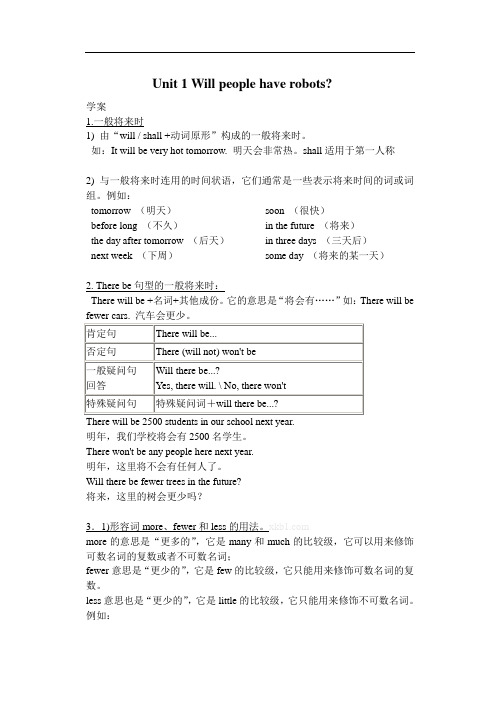
Unit 1 Will people have robots?学案1.一般将来时1) 由“will / shall +动词原形”构成的一般将来时。
如:It will be very hot tomorrow. 明天会非常热。
shall适用于第一人称2) 与一般将来时连用的时间状语,它们通常是一些表示将来时间的词或词组。
例如:tomorrow (明天)before long (不久)the day after tomorrow (后天)next week (下周)soon (很快)in the future (将来)in three days (三天后)some day (将来的某一天)2. There be句型的一般将来时:There will be +名词+其他成份。
它的意思是“将会有……”如:There will beThere will be 2500 students in our school next year.明年,我们学校将会有2500名学生。
There won't be any people here next year.明年,这里将不会有任何人了。
Will there be fewer trees in the future?将来,这里的树会更少吗?3.1)形容词more、fewer和less的用法。
more的意思是“更多的”,它是many和much的比较级,它可以用来修饰可数名词的复数或者不可数名词;fewer意思是“更少的”,它是few的比较级,它只能用来修饰可数名词的复数。
less意思也是“更少的”,它是little的比较级,它只能用来修饰不可数名词。
例如:more pollution 更多的污染fewer apples 更少的苹果less money 更少的钱4. 情态动词might可以表示允许或请求,也可以表示没有把握的推测,通常可以译为“可能、可以”。
例如:It might be difficult for them to talk.5. 短语see sb. do sth.,“看到某人做某事”中,do前面必须省掉“to”。
八年级英语下册Unit1Willpeoplehaverobots教案1人教新目标版
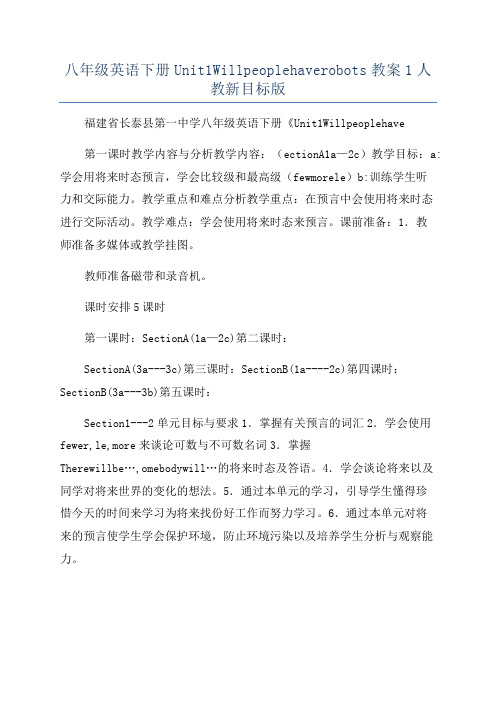
八年级英语下册Unit1Willpeoplehaverobots教案1人
教新目标版
福建省长泰县第一中学八年级英语下册《Unit1Willpeoplehave
第一课时教学内容与分析教学内容:(ectionA1a—2c)教学目标:a:学会用将来时态预言,学会比较级和最高级(fewmorele)b:训练学生听
力和交际能力。
教学重点和难点分析教学重点:在预言中会使用将来时态进行交际活动。
教学难点:学会使用将来时态来预言。
课前准备:1.教
师准备多媒体或教学挂图。
教师准备磁带和录音机。
课时安排5课时
第一课时:SectionA(1a—2c)第二课时:
SectionA(3a---3c)第三课时:SectionB(1a----2c)第四课时:SectionB(3a---3b)第五课时:
Section1---2单元目标与要求1.掌握有关预言的词汇2.学会使用fewer,le,more来谈论可数与不可数名词3.掌握
Therewillbe…,omebodywill…的将来时态及答语。
4.学会谈论将来以及同学对将来世界的变化的想法。
5.通过本单元的学习,引导学生懂得珍
惜今天的时间来学习为将来找份好工作而努力学习。
6.通过本单元对将
来的预言使学生学会保护环境,防止环境污染以及培养学生分析与观察能力。
人教版八年级英语下册《Unit 1 Will people have robots.(通用)》教案_1

Deal with Section B2a,2b.
Play the tape and give the Studentssome directions on how to number the pictures and fill in the blanks.
Listen and write.
三、重点、难点 1.How to understand the text better. 2.Listening practice.
四、教法选择与学法指导
本课时为本单元的第三课时,教师要引导学生巩固阅读材料基础上,介入语言目标,并且通过多种形式的训练以巩固目标语言点.
五、资源准备 1)A computer for multimedia use.2)Listening tape 3)Some good exercises.
1)learn some new words and then do some exercises
2)Listen to the teacher and take notes.
3)Read the text and answer the questions aboutthereading.
Consolidate the knowledge of last period.
Listen and write them down.
1.Strengthen the knowledge.
2.Enable the students to revise the grammar.
七、板书设计
Unit 1 Will people have robots?
Key phrasesandstructures:hundreds of be able tounpleasant pleasant pleasureover and over again get bored = be bored = feel bored
(九年级英语教案)Unit1Willpeoplehaverobots学案

Unit1Willpeoplehaverobots学案九年级英语教案
英语导学案:unit1 will people have robots?(2)
课型新授
主备人
王兵
审核人
使用人
序号
2
备课时间09.08.27
审核时间
使用时间
班级
姓名
学习目标
1. 语言技能目标:能对将来的事进行描述,谈论未知的生活、人口、环境、教育以及科技。
2. 语言知识目标:掌握表示将来时态的用法。
3.情感态度目标:以机器人为话题,培养学生对未来的热爱。
学习重点运用一般将来时能对将来的事进行描述,。
学习难点掌握there be句式一般将来时句式转换。
导学内容
学法指导
导
学
过
程
step1.课堂导入,自学指导:check the homework.
step2.展示提纲,自主学习:复习掌握下列短语。
Will people have robots教案〔优秀篇〕
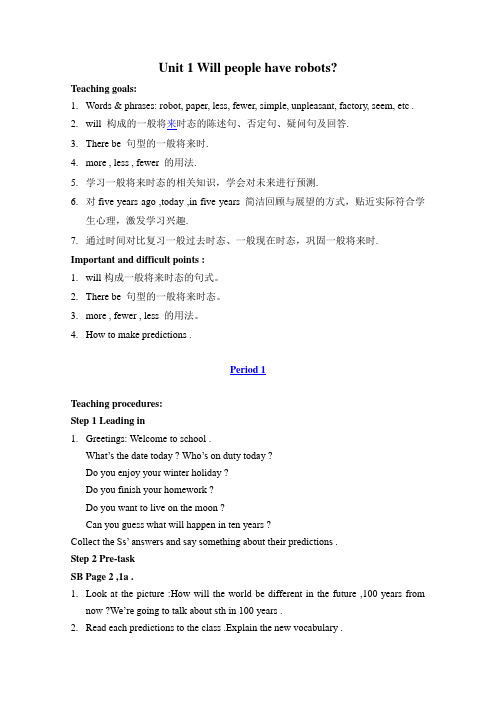
Unit 1 Will people have robots?Teaching goals:1.Words & phrases: robot, paper, less, fewer, simple, unpleasant, factory, seem, etc .2.will 构成的一般将来时态的陈述句、否定句、疑问句及回答.3.There be 句型的一般将来时.4.more , less , fewer 的用法.5.学习一般将来时态的相关知识,学会对未来进行预测.6.对five years ago ,today ,in five years 简洁回顾与展望的方式,贴近实际符合学生心理,激发学习兴趣.7.通过时间对比复习一般过去时态、一般现在时态,巩固一般将来时. Important and difficult points :1.will构成一般将来时态的句式。
2.There be 句型的一般将来时态。
3.more , fewer , less 的用法。
4.How to make predictions .Period 1Teaching procedures:Step 1 Leading in1.Greetings: Welcome to school .What’s the date today ? Who’s on duty today ?Do you enjoy your winter holiday ?Do you finish your homework ?Do you want to live on the moon ?Can you guess what will happen in ten years ?Collect the Ss’ answers and say something about their predictions .Step 2 Pre-taskSB Page 2 ,1a .1.Look at the picture :How will the world be different in the future ,100 years fromnow ?We’re going to talk about sth in 100 years .2.Read each predictions to the class .Explain the new vocabulary .3.Read the instructions .Make sure Ss know what they should do .4.Do it by themselves .5.Talk about the answers with the class .Explain :一般将来时态构成: will / be going to +动词原形Step 3 While-taskSB Page 2 ,1b .1.Practise reading the six predictions .2.Read the instructions to Ss .Circle the things you hear on the recording .3.Play the tape twice .4.Play the tape a third time .At the same time ,check the answers .SB Page 2 , 1c .1.Pay attention to the dialogues .2.Read the dialogues fluently .3.Pairwork .Work in pairs to make predictions according to the sample .4.Ask several pairs to share their conversations to the class .SB Page 3 , 2a & 2b .1.Read the predictions .2.Read the instructions and point out the sample answer .3.Play the tape twice .Ss circle the word they hear in each sentences: more , less ,fewer .4.Check the answers .学生探究: less , fewer 的区别。
Unit1Willpeoplehaverobots教学设计及反思.doc

Unitl Will people have robots?教学案例与反思一、教学内容分析本单元是新课程英语八年级上册中第一单元Unitl W川people have robots? SectionA la-..lc,2a..-2c.语言目标是学习将来时will的用法,will在七年级下册已初步渗透,本单元进一步学习其用法,并与there be结构综合运用。
中学生充满幻想,对未来社会,对人类生活和自己的将来都充满兴趣,充满探索的欲望,所以本廿课要从学生最关心的问题入手,激发学生的想象,拓展学生的思维,以兴趣引导激情,在活动中学习语言知识。
二、学习策略:1、通过耳、口、眼、脑的协同运动,提高听说能力。
2、通过合作学习达到学习目的3、进行多渠道的交流,培养交际能力和语言运用能力。
三、教学目标:语言目标:I、学会用will\there will be描述未来,2、学会用单W robot/everything/pollution 说话,用more/less/few 表达数量。
能力目标:能听憧别人的观点,敢于预测未来,能陈述表达自己的观点。
四、任务活动及完成任务所需要的语言1、模仿练习假设你信认识了一个朋友,你们互相了解对未来的看法Make a conversation according to la. 目标语言:W川people have.../Will kids go...?Will there be...?Task two: 2a—2bNameRobots inpeople's homes More cars More trees More pollution One country inthe world目标语言:1I think there will be more / less / fewer...2Well, I don't agree. But I think there will be ...3Well, I agree. Will there be more / less / fewer..?.4Yes, there will .5No, there won't. I think...小组汇报:... thinks there will be...And/but I think...3、.畅想未来学生用自己准备的图画来畅想自」的、国家的、社会的未来。
Unit 1 Will people have robots_英语 教学设计
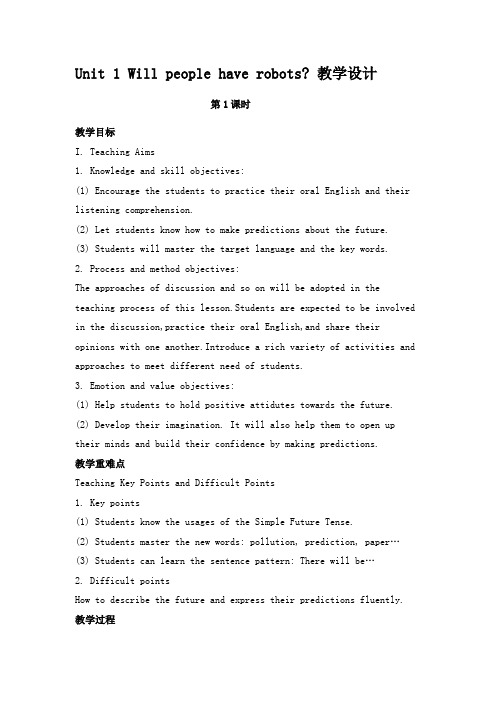
Unit 1 Will people have robots? 教学设计第1课时教学目标I. Teaching Aims1. Knowledge and skill objectives:(1) Encourage the students to practice their oral English and their listening comprehension.(2) Let students know how to make predictions about the future.(3) Students will master the target language and the key words.2. Process and method objectives:The approaches of discussion and so on will be adopted in the teaching process of this lesson.Students are expected to be involved in the discussion,practice their oral English,and share their opinions with one another.Introduce a rich variety of activities and approaches to meet different need of students.3. Emotion and value objectives:(1) Help students to hold positive attidutes towards the future.(2) Develop their imagination. It will also help them to open up their minds and build their confidence by making predictions.教学重难点Teaching Key Points and Difficult Points1. Key points(1) Students know the usages of the Simple Future Tense.(2) Studen ts master the new words: pollution, prediction, paper…(3) Students can learn the sentence pattern: There will be…2. Difficult pointsHow to describe the future and express their predictions fluently. 教学过程Teaching ProceduresStep1. Greet the class and sh ow a short video to arouse students’ interest.Step2. Warm UpUse two pictures to let students learn the sentence pattern: There will be…Step3. Presentation1. Teaching 1aStudents read the six statements and show their opinions.2. Teaching 1bStudents listen and circle the predictions they hear.3. Pairwork 1cStudents practice the given dialogues and then make new conversations.4. Listening Comprehension (2a&2b)Activity 1: Students read the sentences in 2a.Activity2: Students listen to the recording again and finish the task in 2b.5. Language StudyFocus on the usages of more,less and fewer and finish the exercises. Step4. Consolidation1. Fill in the blanks with “will” or “won’t”.2. Do the translation exercises.Step5. SummaryIn this class, we’ve learned some important words, such as pollution, future, prediction…We know how to make predictions and get the differences of more, fewer and less. We also get to know the Simple Future Tense.课后习题HomeworkWrite an article about the food-wasting problem,show your new ways to deal with it.。
人教版八年级英语下册:Unit 1 Will people have robots- (第一课时)优秀教案

人教版八年级英语下册:Unit 1 Will people have robots? (第一课时)优秀教案课题人教版八年级英语下册:Unit 1 Will people have robots? (第一课时)教材分析本单元主要学习动词will及there be的一般将来时的用法,学会运用will及there will be的一般将来时态的陈述句,否定句,疑问句及回答。
并能正确使用more,less,fewer .本单元围绕对未来预测这一话题展开,先从人们将来的日常生活着手,练习使用will的一般将来时的用法及其肯,否定的回答,其次从人们居住的环境的污染问题入手,练习使用there will be 以及more,less,fewer的用法,最后又谈论过去,现在和将来的事情来练习一般过去时,一般现在时和一般将来时.来练习,巩固所学的语言目标。
学情分析本单元的主题是利用will 及there will be对未来进行预测,能正确使用一般将来时,同时引导学生使用所学句型对未来进行预测,一般将来时这一时态是初中英语英语教学中的一个重要时态,八年级的学生已经有一定的语言表达能力,在语言运用上有一定的基础,应对学生的知识的延伸和扩展做好充分的准备,针对学生这一青少年的年龄特点,他们有很强的求知欲和表现欲,自主探究的合作学习无疑是给他们一个发展和接受新知识的良好空间。
Section A教师寄语:Confidence in yourself is the first step on the road to success.自信是走向成功的第一步。
Knowledge goals(知识目标)Words&phrases: robot, paper, less, fewer, will, pollution,space station,on computers,in 100 years,live to be 200 years old etc.Target language: Will people …? Yes, they will /No, they won’t .There will be…Grammar:1.学习并掌握will 构成的一般将来时态的陈述句、否定句、疑问句及回答.2. 学习并掌握There be 句型的一般将来时.3.More , less , fewer 的用法.Ability goals(能力目标):用一般过去时、一般现在时和一般将来时谈论过去、现在和将来发生的事情。
八年级英语下册_Unit1_Will_people_have_robots导学案_人教新目标版
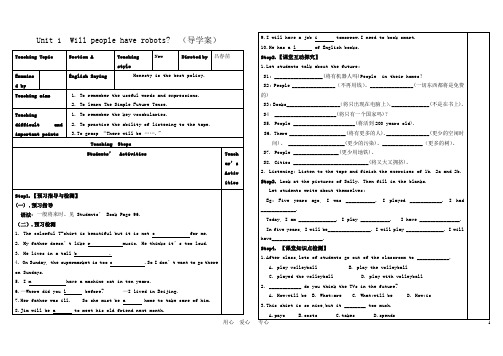
8.Jim will beato meet his old friend next month.
9.I will have a jobitomorrow.I need to book smart.
S8. Cities ____________________________(将又大又拥挤)。
2. Listening: Listen to the tape and finish the exercises of 1b. 2a and 2b.
Step3.Look at the pictures of Sally. Then fill in the blanks.
A. play volleyballB. play the volleyball
C. played the volleyballD. play with volleyball
2. ____________ do you think the TVs in the future?
A. How;will beB. What;areC. What;will beD. How;is
—______ ______ be a meeting tomorrow?—No, _________ _________.
22.The child will take the bus to school.(改为否定句)
The child ____________ ____________ the bus to school.
5. ________ students in my school are interested in listening to music.
人教版新目标八年级下册英语教案Unit1Willpeoplehaverobots

人教版新目标八年级下册英语教案Unit1 Willpeople have robots?教学目标1.知道未来的机器人可能有什么特点和功能。
2.学会使用will表达未来时态。
3.学会询问和回答有关未来的问题。
教学重点1.学会使用will表达未来时态。
2.学会询问和回答有关未来的问题。
教学难点1.学会使用will表达未来时态。
2.学会询问和回答有关未来的问题。
教学过程导入(5分钟)1.引入话题:“What kind of robots do you know?”(你们知道哪种机器人?)2.学生回答问题,老师根据学生的回答,引入今天的教学内容,即,未来的机器人可能有什么特点和功能,以及如何使用will表达未来时态。
新知讲解(20分钟)1.老师介绍几种未来可能出现的机器人及其功能。
例如:service robots 可能会帮助人们做家务,或者caregiver robots 可能会照顾老人和儿童,或者agricultural robots 可能帮助农民收获作物等等。
2.老师介绍使用will表达未来时态的方法。
例如:Iwill visit my grandparents next month. 或者 Theywill have a party next week. 提示学生将will后面的动词原形即可。
3.老师讲解如何做疑问句和否定句。
例如:Will yougo shopping tomorrow? 或者 They will not go toschool on Sunday.练习(30分钟)1.小组讨论,让学生在小组里面编对话练习日常生活中有关未来的交流,例如:将来你会去哪里旅行?或者,你希望有一种什么样的机器人协助你的生活?2.分组表演对话,让学生展示他们的对话。
巩固(10分钟)1.教师打出以下5个句子,要求学生根据所学内容判断哪个句子是肯定的,哪个句子是否定的,哪个句子是疑问的。
–I will go to New York City next year.–She will not go to the party.–Will you have a picnic with us?–They will have a test tomorrow.–My parents will not travel to China.作业(5分钟)1.布置作业:让学生自己写五个有关未来的句子,并使用will表达未来时态。
人教英语八年级下Unit-1-Will-people-have-robots教案1

1.Ask students to think about the life in the future , they may talk about it in Chinese when necessary.
2.Show the pictures of future and help the students to learn and talk.
1.Strengthen the knowledge.
2.Enable the students to write with the key sentences they learned.
Notes of this period
Contents on the Bb
1. What do you think life will be like in 100 years? robot
. Teaching aids
Radio, pictures.
Aims and Demands
Warming up
1.Greetings.
2.Free Talk.
Arouse the Ss’ interesting of learning and make a comfortable situation for the students.
Post-task
3.Do some exercise.
4.Teacher appraise those who did well in class.
Enable the Ss to write.
Summary
3.Go over the usages.
4.Revise the main sentences .
【教育学习文章】Unit 1 Will people have robots -教案
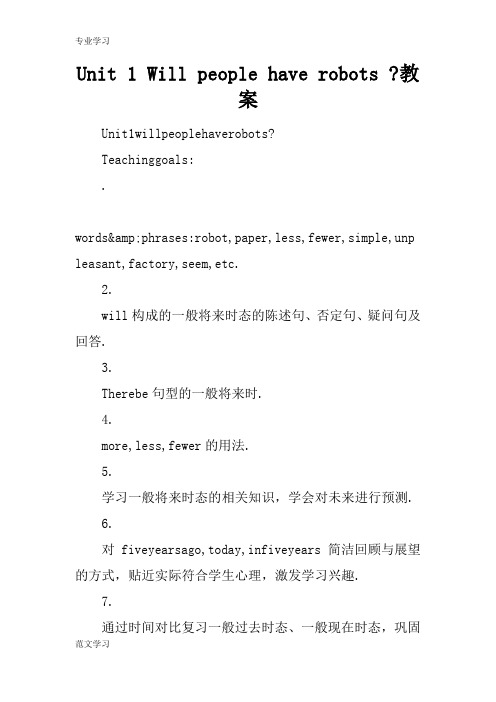
Unit 1 Will people have robots ?教案Unit1willpeoplehaverobots?Teachinggoals:.words&phrases:robot,paper,less,fewer,simple,unp leasant,factory,seem,etc.2.will构成的一般将来时态的陈述句、否定句、疑问句及回答.3.Therebe句型的一般将来时.4.more,less,fewer的用法.5.学习一般将来时态的相关知识,学会对未来进行预测.6.对fiveyearsago,today,infiveyears简洁回顾与展望的方式,贴近实际符合学生心理,激发学习兴趣.7.通过时间对比复习一般过去时态、一般现在时态,巩固一般将来时.Importantanddifficultpoints:.will构成一般将来时态的句式。
2.Therebe句型的一般将来时态。
3.more,fewer,less的用法。
4.Howtomakepredictions.PeriodTeachingprocedures:Step1Leadingin.Greetings:welcometoschool.what’sthedatetoday?who’sondutytoday?Doyouenjoyyourwinterholiday?Doyoufinishyourhomework?Doyouwanttoliveonthemoon?canyouguesswhatwillhappenintenyears?collecttheSs’answersandsaysomethingabouttheirpredictions.Step2Pre-taskSBPage2,1a..Lookatthepicture:Howwilltheworldbedifferentinthefut ure,100yearsfromnow?we’regoingtotalkaboutsthin100years.2.Readeachpredictionstotheclass.Explainthenewvocabula ry.3.Readtheinstructions.makesureSsknowwhattheyshoulddo.4.Doitbythemselves.5.Talkabouttheanswerswiththeclass.Explain:一般将来时态构成:will/begoingto+动词原形Step3while-taskSBPage2,1b..Practisereadingthesixpredictions.2.ReadtheinstructionstoSs.circlethethingsyouhearonthe recording.3.Playthetapetwice.4.Playthetapeathirdtime.Atthesametime,checktheanswers.SBPage2,1c..Payattentiontothedialogues.2.Readthedialoguesfluently.3.Pairwork.workinpairstomakepredictionsaccordingtothe sample.4.Askseveralpairstosharetheirconversationstotheclass.SBPage3,2a&2b..Readthepredictions.2.Readtheinstructionsandpointoutthesampleanswer.3.Playthetapetwice.Sscirclethewordtheyhearineachsente nces:more,less,fewer.4.checktheanswers.学生探究:less,fewer的区别。
英语人教版八年级下《Unit1Willpeoplehaverobots》教案5

八年级下英语第5课时【课题】Unit1 Will people have robots? Reading【励志小木屋】Constant dropping wears the stone.(滴水穿石。
)【预习目标】(一)、知识与能力:1.Master the words、phases and sentences.2.通过运用多种阅读技巧,提高快速准确的筛选文章信息的能力,从而提高阅读水平。
(二)、过程与方法:通过反复阅读和pairwork, groupwork学会预知将来并掌握阅读策略。
(三)、情态动词与价值观:Learn to share information with their partners. 【预习重难点】掌握阅读策略。
一.自主预习:(一)、预习任务:Task 1:写出下列短语:1. 在未来_________________2、做同样的事情__________________3、看起来像______________________4、寻找_________________5、反复、一遍遍的____________________6、和……相同____________________7.变得厌倦___________________8.大量许多、上百的_______________Task: 2阅读后填词:Some _______believe that there _____ _____such robots in the future.However, they ______it may take _______ of years. Scientists are now _____ to make robots look like people and do the same things ____us. Japanese have already made robots walk and _______. This kind of robot will also ___fun______ ________.But James White _______. He thinks that it will be________for a robot to do the ______ things as a ______.Mr White thinksthat robots won’t be _____to do this. But other scients disagree. They think that robots will be ____ to talk to people ____25 to 50 years.(二)、预习诊断:根据汉语提示完成句子1、I hope your dream(梦想)will ________ __________(实现)one day.2、What will the robots be like______ _______ _________ ?(将来)3. I saw _________ ___________(数百)seagulls in the sky this morning.4、I think even a child can answer_______(这样)a________(简单的)question.5、His father is _________(很可能)bored with so much __________(家务活).6、Who_________(使得)the boy cry?(三)预习置疑:Do you have any questions?__________________二、课中实施:Step1: Warming-up Step2: Lead-in Step3: Finish some tasks by reading. Step4 精讲点拨hundreds of 几百数百许多试译:我校图书馆收藏着几百本书。
- 1、下载文档前请自行甄别文档内容的完整性,平台不提供额外的编辑、内容补充、找答案等附加服务。
- 2、"仅部分预览"的文档,不可在线预览部分如存在完整性等问题,可反馈申请退款(可完整预览的文档不适用该条件!)。
- 3、如文档侵犯您的权益,请联系客服反馈,我们会尽快为您处理(人工客服工作时间:9:00-18:30)。
Unit 1 Will people have robots?学案第一课时:(语法及课文1a-1c)一、学习目标:1.语法:一般将来时will表将来的用法。
2.in+时间段(……之后)表将来的时间。
3.本节重要词组、句型。
二、重难点:1.语法:一般将来时will表将来的用法。
2.There be 的一般将来时表达方式。
①There is/are going to be …②There will be …三、学法指导:学生自学,教师点拨,多读,多背,善于总结。
四、本课时重要词组1.at their homes在他们家里 2.be free 免费3.on paper 在纸上 4.study at home on computers 在家里通过电脑学习5. live to be 200 years old 活到200岁6.in 100 years一百年以后五、本课时重难点突破预案语法突破:一般将来时1.现在进行时表将来。
用法:表示位置转移的动词(如go ,come, leave, start, arrive, return, move,fly,travel等)常用进行时表将来。
需要注意的是如果这些词和将来的时间状语连用要翻译成“打算,准备……”如:①The Browns are coming for dinner tomorrow.布朗一家准备明天来吃晚饭。
②I’m going shopping this afternoon.我准备今天下午去买东西。
③They are leaving for Beijing next Sunday.他们准备下周动身去北京。
2.be going to +动词原形表将来。
用法: ①表示说话人根据现在已有的的迹象,判断将要或即将发生某种情况。
Look at those black clouds! It’s going to rain.看看那些乌云,天快要下雨了。
②表示计划、打算要做某事,这些事情往往是事先考虑过的。
I’m going to be a movie star when I grow up.我长大了想成为一名电影名星。
3.Will(shall)+动词原形用法表示单纯的将来,即将来将要发生的事。
构成:“助动词will +动词原形”,表示将来某个时间要发生的动作或存在的状态,也可表示将来经常或反复发生的动作。
More and more people will drive cars in the future将来越来越多的人将要开小汽车。
注:①在口语中,will在名词或代词后常缩略为’ll, 如I will =I’ll , he will= he’ll , they will= they’ll …。
否定句中will not 常缩略为won’t,如:Kids won’t go to school=Kids will not go to school,一般疑问句中应把will 放到句首,如:Will people use money in 100 years?。
所有人称都可以用will,主语为第一人称(I, we)时,也常用助动词shall。
②在表示“带意愿色彩的将来”时,常用助动词will。
如:I will tell you all about it.③在问对方是否愿意,或表示客气的邀请或命令,也常用助动词will,但此时will 不表示将来。
如:Will you please open the window?④在疑问句中,主语为第一人称时常用助动词shall。
如:When shall we meet?4.特别注意★★★there be 的一般将来时句型就表述为:①There is / are going to be……②There will be……,将要有(运动会,班会,考试等)要举行,不能表述为There is /are going to have/hold……×There is going to be an exam tomorrow.明天将有一场考试。
5.一般将来时的标志:一般将来时常和将来的时间状语连用。
如:tomorrow明天, next …(next Sunday下星期天), in +时间段(in two days两天后,in 100 hundred years100年以后),in 2015(在2015年)等。
针对性练习:①We____________________(go) shopping tomorrow afternoon.②The girl__________________________(buy) a new computer next year.③There____________(有)two basketball matches on TV tomorrow afternoon.④I think People________________________(have) robots in the future.⑤Kids ______________________(study) at home on computers in 2050.六、本课时反馈练习:( )1.Do you think people will have robots__________?A.at their homesB.in their homeC.in their homes( )2.What will Sally be____ten years? A.after B.in C.behind( )3.--___will she get to Shanghai?—In three hours.A.How longB.How soon( )4.There ______a sports meeting next week.A.isB.will haveC.will be( )5.Please pass me two____.A.pieces of paperB.pieces of papersC.pieces paper( )6..His parents went to the cinema half an hour ago and they will be back_____about two hours.A.afterB.inC.for第二课时(P3-4)一、学习目标:P3-4重要词组及句型二、重难点:more, less fewer, little, few区别及用法。
三、学法指导:学生自学,教师点拨,多读,多背。
四、本课时重要词组P31.more people更多的人 2.less free time更少的闲暇时间3.less pollution更少的污染 4.fewer trees更少的树5.be big and crowded 大而且拥挤P46.be in college 在上大学五、重难点突破预案1. more, less, fewer的用法区别:more为many, much的比较级,意为“更多”,可修饰可数与不可数名词。
less是little的比较级,意为“更小,较少”,修饰不可数名词。
fewer是few的比较级,意为“更少”,修饰可数名词复数。
【注意】few, little表示否定“几乎没有”。
a few, a little表示肯定“一点,几个”。
如,Because he often stays at home, he has ______ friends.针对性练习:1.She is new here.She has ______friends here. A.few B.little C.more2.The city will have_____trees and_____pollution.A.more;fewerB.less;fewerC.more;less3.They did_____work with______money and_____people.A.more;fewer;moreB.more;less;fewerC.less;less;fewer4.Ann is very busy these days.She has ____time to play with me.A.fewB.a fewC.little2.语法:一般过去时,一般现在时,一般将来时的用法区别。
①注意各时态的时间标志词②注意各时间动词的变化:过去式,原形(三单),will+动词原形针对性练习:用所给动词的适当形式填空1.They _____(play)football tomorrow.2.The radio says the clouds_____(leave)later on.3.I ______(not leave)until he comes back.4.There______(not be)a football match in our college next week.5.Kate often_____(watch)TV at home,but this evening she ______(watch)a new play at thetheatre.6.I _______(study)in high school ten years ago and now I ______(be)a teacher.反馈练习:1.--______will your cousin come back from Hong Kong?--In two days,I think. A.How far B.How soon C.How often D.How fast2.Supermarkets are necessary.People usually spend______time finding things they want ,but they usually spend______money than they want. A.less;less B.less;moreC.fewer;more3.—There _____a concert this evening.—Yeah.Exciting news.A.are going to beB.is going to beC.will be4.Don’t turn on the TV.Grandma______now.A.is sleepingB.will sleepC.sleeps5.Now telephones are very popular and they are much_____than before.A.cheapB.cheaperC.the cheapest第三课时Section B(P5-6)一、学习目标:1、继续学习一般将来时(will+动词原形)2、3a重要词组及句型二、重难点:fall in love with, as, live alone, be able to等词及短语的用法。
